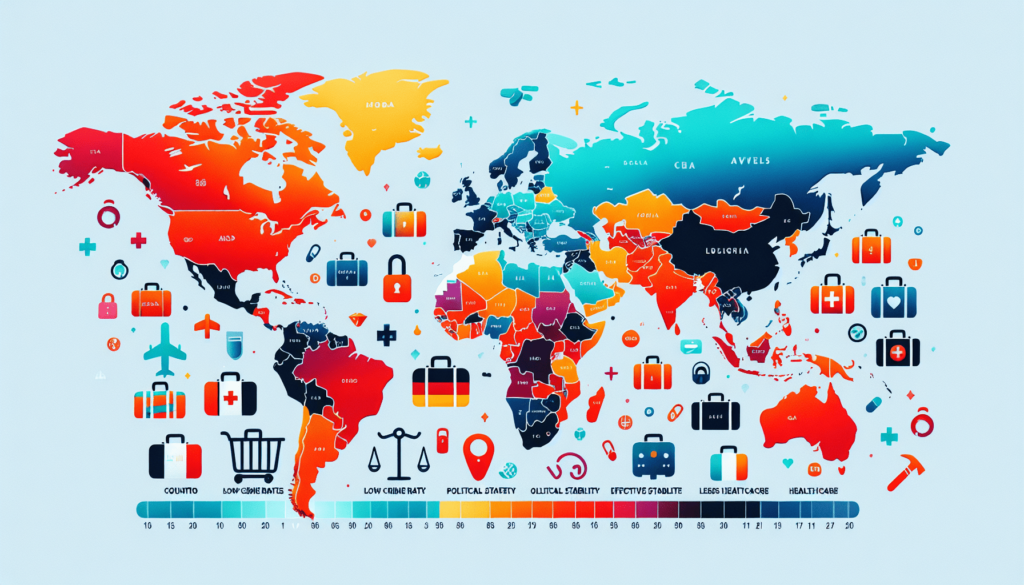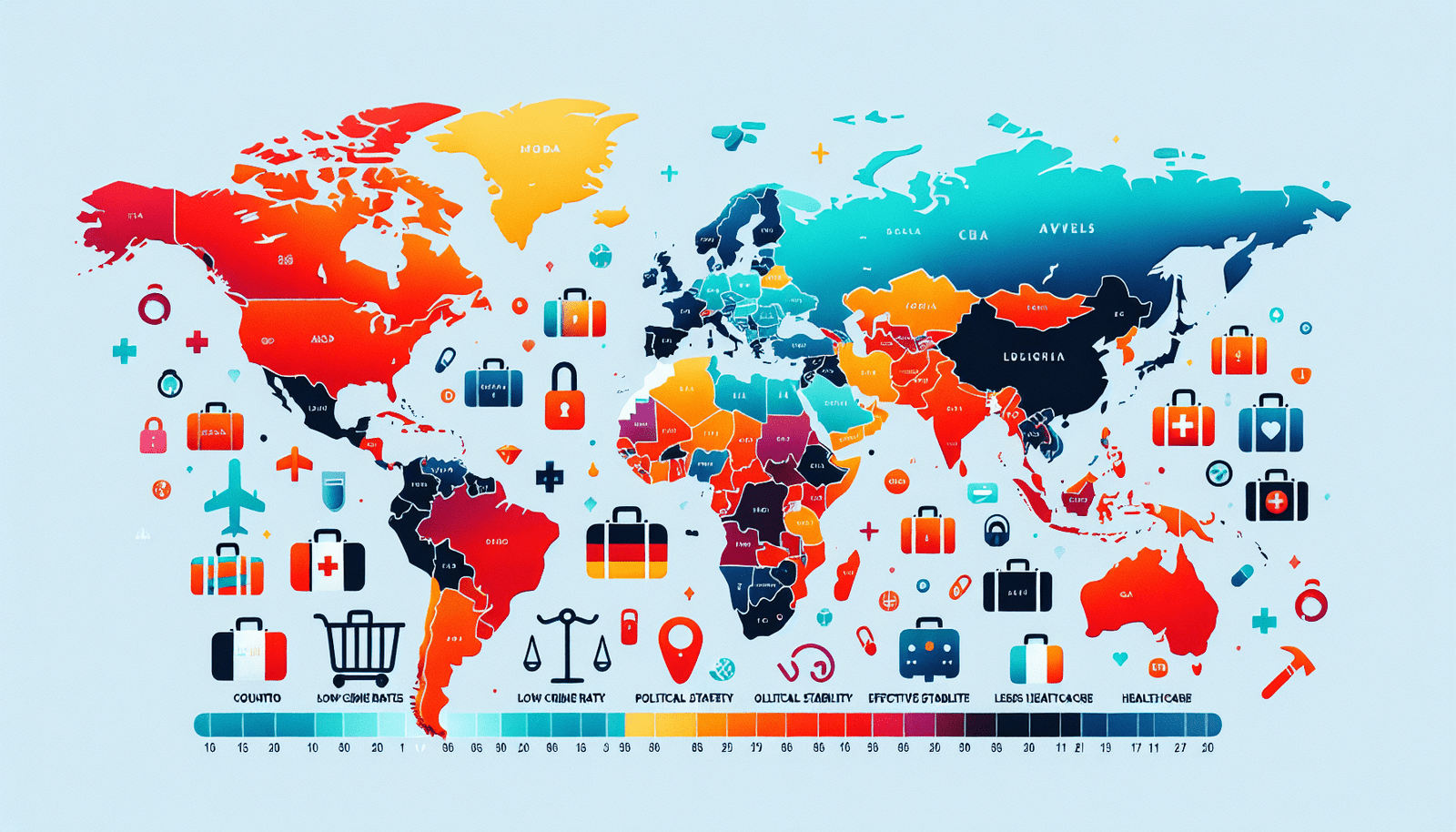Planning a vacation but concerned about safety? Look no further! This article provides a comprehensive guide to the safest countries to visit. Whether you’re interested in breathtaking natural landscapes, rich historical sites, or vibrant cultures, we’ve got you covered. Discover which destinations offer the peace of mind you deserve, allowing you to fully enjoy your well-deserved getaway. So, pack your bags and get ready to explore the world in a safe and secure manner!
Overview of Safe Countries
Definition of Safety
When it comes to traveling to a new country, safety should always be a top priority. But what exactly does safety mean in the context of travel? Safety can be defined as the absence of harm or danger to individuals, both residents and tourists alike. It encompasses various aspects, including personal safety, political stability, healthcare services, natural disaster preparedness, crime rates, social stability, environmental safety, and more. Understanding the factors that contribute to the safety of a country can help you make informed decisions when choosing your travel destinations.
Factors Affecting Safety
Safety in a country can be influenced by a myriad of factors. Some of the key factors that play a significant role in determining the safety of a country include:
- Law and Order: The presence of a robust and effective legal system, along with law enforcement agencies, ensures the maintenance of peace and order within the country.
- Political Stability: A politically stable country provides a secure environment for its citizens and visitors. It signifies a strong and reliable government that is capable of upholding the rule of law.
- Health and Medical Services: Access to quality healthcare services, availability of medical facilities, and emergency medical services are vital aspects of safety for both residents and tourists.
- Natural Disasters Preparedness: Countries prone to natural disasters must have effective disaster response systems and emergency evacuation plans in place to minimize potential harm to individuals.
- Level of Crime: Low crime rates, the absence of organized crime, and effective measures against tourist-targeted crimes are essential for ensuring personal safety.
- Social Stability and Equality: Societal harmony, equality of rights, and a safe environment free from discrimination and prejudice contribute to the overall safety of a country.
- Environmental Safety: Maintaining clean air and water quality, mitigating natural environmental hazards, and implementing policies and initiatives to protect the environment are crucial for the well-being of residents and visitors alike.
Importance of Safety in Choosing Travel Destinations
Safety is a paramount consideration for travelers when selecting their destinations. By choosing safe countries to visit, you can greatly reduce the risk of encountering any harm or danger during your trip. Safety provides peace of mind, allowing you to fully enjoy your travel experiences and explore the wonders of a new culture without constant worry. Additionally, safe countries often have reliable infrastructure, well-maintained facilities, and efficient emergency services, which further enhance the overall travel experience. Whether you’re planning a solo adventure or a family vacation, prioritizing safety ensures a smooth and enjoyable journey.
Ranking of Safest Countries
Global Safety Index
To evaluate the safety of countries globally, various organizations and indices provide comprehensive rankings based on multiple factors. The Global Safety Index is one such widely recognized index that assesses the safety of countries around the world. This index takes into account factors such as crime rates, political stability, terrorism threats, healthcare quality, and natural disaster preparedness to determine a country’s overall safety ranking.
Top 10 Safest Countries
Based on the Global Safety Index, the top 10 safest countries to visit consistently rank high in terms of safety and security. These countries have demonstrated a commitment to maintaining a safe environment for residents and tourists alike. While the rankings may vary slightly between different indices, the following countries often feature prominently:
- Iceland
- New Zealand
- Switzerland
- Singapore
- Finland
- Australia
- Norway
- Denmark
- Canada
- Japan
Regional Safety Variations
It’s important to note that safety levels can vary within regions and even within countries. While a country may be considered safe on a global scale, certain regions within that country may have higher crime rates or other safety concerns. It is always advisable to research specific regions or cities before planning your travel itinerary to ensure a holistic understanding of the safety situation.
Safety Measures and Infrastructure
Law and Order
Strong law enforcement agencies and a well-functioning legal system are crucial factors contributing to a safe environment in a country. Countries that prioritize the rule of law and enforce regulations effectively are better equipped to maintain law and order, ensuring the safety of their residents and visitors.
Public Safety Initiatives
Many countries have implemented various public safety initiatives to enhance the overall safety of their communities. These initiatives may include heightened police presence in public spaces, community outreach programs, and public awareness campaigns to educate residents and tourists about safety measures and emergency protocols.
Tourist Police
Tourist police units are specialized law enforcement agencies dedicated to ensuring the safety and security of tourists. These units often have multilingual police officers who can assist tourists in case of emergencies, provide directions, and offer support and guidance throughout their stay.
Emergency Services
The availability of efficient emergency services is crucial for ensuring the well-being of both residents and tourists. Countries with well-developed emergency response systems, including police, fire, and medical services, can provide timely assistance in case of accidents, illnesses, or other emergencies.
Transportation Safety
Transportation safety plays a significant role in overall travel safety. Countries that prioritize transportation safety maintain well-maintained roads, reliable public transportation systems, stringent safety regulations for vehicles, and high standards of driver training. This ensures the safe and efficient movement of people within the country.
Political Stability
Political Environment
The political environment of a country greatly influences its safety and security. Stable political systems with clear governance structures and established democratic institutions contribute to a safe environment for residents and visitors alike. Countries with political stability are less likely to experience disruptions or unrest that could jeopardize the safety of individuals.
Civil Unrest
Countries experiencing civil unrest or political upheaval may pose safety challenges for residents and tourists. Protests, demonstrations, or other forms of civil unrest can lead to violence or unrest in public spaces. It is important to stay informed about the political climate of a country and avoid areas where unrest is likely to occur.
Terrorism Threats
Terrorism threats are a global concern, and some countries may have a higher risk of terrorist activities. Governments around the world work diligently to counter terrorism, implement security measures, and collaborate internationally to ensure the safety of their citizens and visitors. It is advisable to stay updated on travel advisories and follow government guidelines regarding travel to countries with potential terrorism threats.
Inter-state Conflicts
Inter-state conflicts can introduce safety concerns when traveling to border regions or areas impacted by geopolitical tensions. It is essential to stay informed about potential conflicts and border disputes to make informed decisions regarding travel itineraries. Government travel advisories often provide guidance on areas to be cautious of due to conflicts or tensions.
Health and Medical Services
Quality of Healthcare
Access to quality healthcare services is vital for maintaining personal safety while traveling. Countries that prioritize healthcare infrastructure, have well-trained medical professionals, and maintain high standards of healthcare provision offer peace of mind to visitors. It is advisable to research the quality of healthcare services in your destination country and obtain travel insurance that covers any potential medical expenses.
Availability of Medical Facilities
The accessibility and availability of medical facilities, including hospitals, clinics, and pharmacies, are essential considerations for travelers. Countries with well-developed medical infrastructure ensure that medical assistance is readily available, especially in popular tourist destinations.
Emergency Medical Services
In case of medical emergencies, access to timely and efficient emergency medical services is of utmost importance. Safe countries often have well-coordinated emergency response systems, including ambulance services, that can provide immediate medical assistance and transportation to medical facilities.
Access to Medications
Travelers with pre-existing medical conditions or those requiring specific medications must ensure that their necessary medications are readily available in their destination country. It is advisable to carry an adequate supply of medications, along with relevant prescriptions, and be aware of any restrictions or documentation requirements for bringing medications into the country.
Natural Disasters Preparedness
Geographical Location
The geographical location of a country significantly influences its vulnerability to natural disasters. Countries located in areas prone to hurricanes, earthquakes, tsunamis, or other weather-related disasters must have robust disaster preparedness plans in place to protect residents and visitors.
Historical Natural Disasters
The occurrence of past natural disasters can be an indicator of a country’s preparedness for future events. Countries that have experienced and effectively managed previous disasters often develop comprehensive response systems and infrastructure to mitigate the impact of future disasters.
Disaster Response Systems
Countries with well-established disaster response systems can quickly mobilize resources and provide assistance to affected areas in the event of a natural disaster. These systems encompass early warning systems, evacuation plans, and coordination between government agencies to ensure an efficient and effective response.
Emergency Evacuation Plans
Having effective emergency evacuation plans is crucial for ensuring the safety of individuals during natural disasters. Countries that invest in developing evacuation plans, along with designated evacuation routes and well-equipped shelters, can minimize casualties and provide swift evacuation for residents and tourists.
Level of Crime
Crime Rates
Low crime rates are indicative of a safe country to visit. Countries with low rates of violent and property crimes provide a secure environment for residents and tourists alike. Monitoring crime statistics, such as homicide rates, theft rates, and assault rates, can help identify the safety levels of a country.
Types of Crimes
While overall crime rates are important, understanding the types of crimes prevalent in a country can provide additional insights into safety concerns. Some countries may have low violent crime rates but higher rates of petty theft or scams targeted specifically at tourists. Familiarizing yourself with common scams or tourist-targeted crimes in your destination country can help you stay vigilant and take necessary precautions.
Organized Crime
The presence of organized crime can pose a significant safety risk. Countries that effectively combat organized crime through robust law enforcement efforts, intelligence sharing, and international collaboration create a safer environment for residents and visitors.
Scams and Tourist-targeted Crimes
Tourists can be particularly vulnerable to scams, theft, and other crimes targeted at visitors. Safe countries often prioritize the safety of tourists by implementing measures such as increased police presence in tourist areas, public awareness campaigns, and specialized tourist police units to protect visitors from falling victim to scams or other crimes.
Social Stability and Equality
Societal Harmony
Countries that value societal harmony and prioritize social cohesion create a safe environment for all inhabitants. Encouraging cultural diversity, fostering inclusive communities, and promoting cross-cultural understanding contribute to the overall social stability of a country.
Discrimination and Prejudice
The presence of discrimination or prejudice can undermine the safety and well-being of individuals within a country. Safe countries actively work towards minimizing discrimination, ensuring equal rights and opportunities for all residents and visitors irrespective of their race, religion, ethnicity, or other characteristics.
Equality of Rights
Respecting and guaranteeing equality of rights is crucial for promoting a safe and inclusive society. Countries that uphold the principles of equality, regardless of gender, sexual orientation, or socio-economic status, foster an environment where all individuals feel valued, safe, and protected.
Gender Safety
Promoting gender safety is a vital aspect of ensuring overall safety in a country. Safe countries prioritize gender equality, implement measures to combat gender-based violence, and create safe spaces for all genders. Such countries often have strong legal frameworks and support systems in place to assist victims and hold perpetrators accountable.

Environmental Safety
Air and Water Quality
Maintaining clean air and water quality is essential for the overall well-being and safety of residents and visitors. Countries that prioritize environmental safety implement measures to reduce air pollution, promote sustainable practices, and ensure the availability of safe drinking water.
Natural Environmental Hazards
Countries that effectively manage and mitigate natural environmental hazards create a safer living and travel environment. This includes measures such as coastal protection against storm surges and tsunamis, landslide prevention, and monitoring volcanic activity to minimize risks to individuals.
Policies and Initiatives
Countries committed to environmental safety implement policies and initiatives to protect the environment and promote sustainable practices. These policies may include regulations on waste management, conservation efforts for natural habitats, and promotion of renewable energy sources. By safeguarding the environment, these countries contribute to the overall safety and well-being of their residents and visitors.
Safe Travel Resources
Government Travel Advice
Government travel advisories are valuable resources for travelers seeking information on the safety of various destinations. Many governments provide up-to-date travel advisories that highlight potential safety concerns, areas to avoid, and necessary precautions to take while traveling. Checking these advisories before planning your trip can help you make informed decisions and stay safe during your travels.
Embassy Support
Embassies and consulates play a crucial role in ensuring the safety of their citizens abroad. In case of emergencies, such as loss of passport, accidents, or other unforeseen circumstances, seeking assistance from your country’s embassy or consulate can provide you with the necessary support and guidance.
Insurance Coverage
Securing appropriate travel insurance coverage is an essential aspect of ensuring personal safety. Travel insurance can provide financial protection in case of medical emergencies, trip cancellations, travel disruptions, or loss of belongings. It is important to carefully review the coverage details, including medical expenses, evacuation costs, and personal liability, to ensure comprehensive protection during your travels.
Tourist Guides and Agencies
Engaging the services of reputable tourist guides or agencies can enhance the safety of your travels. Qualified and experienced guides can provide valuable insights into local customs, safety tips, and recommended attractions. They can also assist with coordination, translation, and local knowledge, ensuring a smooth and secure travel experience.
In conclusion, ensuring safety while traveling is paramount to having a positive and enjoyable experience. By considering factors such as law and order, political stability, healthcare services, natural disaster preparedness, crime rates, social stability, environmental safety, and utilizing reliable travel resources, you can make informed decisions and choose safe countries to visit. Prioritizing safety allows you to truly immerse yourself in a new culture, explore new destinations, and create lasting memories without compromising your well-being. So, remember to prioritize safety when planning your next adventure!




